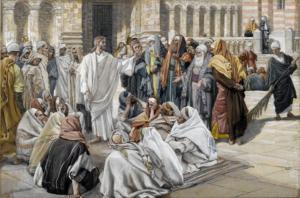“But do not think I will accuse you before the Father. Your accuser is Moses, on whom your hopes are set. If you believed Moses, you would believe me, for he wrote about me. But since you do not believe what he wrote, how are you going to believe what I say?” John 5:45-47
 I recently came across a comment inspired by one of my posts on Adam that reflected on this passage from John. The basic idea, according to the commenter, is that we must stick to a specific interpretation of Genesis or we are rejecting Moses, the first step in a process that will inevitably lead to rejection of the message Jesus teaches.
I recently came across a comment inspired by one of my posts on Adam that reflected on this passage from John. The basic idea, according to the commenter, is that we must stick to a specific interpretation of Genesis or we are rejecting Moses, the first step in a process that will inevitably lead to rejection of the message Jesus teaches.
Another comment along the same line reflected on Jesus’s teaching on marriage.
“It was because your hearts were hard that Moses wrote you this law,” Jesus replied. “But at the beginning of creation God ‘made them male and female.’ ‘For this reason a man will leave his father and mother and be united to his wife, and the two will become one flesh.’ So they are no longer two, but one flesh. Therefore what God has joined together, let no one separate.” Mark 10:5-9 (Also Matthew 19:4-6)
Clearly, according to this second commenter, the reference to Genesis 1 and 2 in this discussion of divorce is a clear indication that Jesus is corroborating a specific interpretation of these passages when it comes to Adam, Eve, and human origins, an interpretation that requires two unique individuals, sole progenitors of the human race.
In this post I don’t want to get sucked into yet another discussion of the appropriate interpretation of Genesis 1-3 or 1-11. It’s more important to step back and think clearly about the teaching of Jesus as well as the point of his references to Moses and to marriage.
Frankly I don’t think that the historicity of Adam and Eve, the length of creation ‘days’, or the possibility of evolution figured into the teaching of Jesus in either of these passages. Rather, the passages, and for that matter most of Jesus’s teaching, can be summed up by the teachings of the prophets, the teaching of Jesus on the greatest commandments, and his teachings on servant-hood and unity. These are all part of the same message.
One of them, an expert in the law, tested him with this question: “Teacher, which is the greatest commandment in the Law?”
Jesus replied: “‘Love the Lord your God with all your heart and with all your soul and with all your mind.’ This is the first and greatest commandment. And the second is like it: ‘Love your neighbor as yourself.’ All the Law and the Prophets hang on these two commandments.” Mt 22:35-40
In the parallel passage in Luke 10, Jesus answers by asking a question “What is written in the Law?…How do you read it?” and the expert in the law answered:
“‘Love the Lord your God with all your heart and with all your soul and with all your strength and with all your mind’; and, ‘Love your neighbor as yourself.’”
“You have answered correctly,” Jesus replied. “Do this and you will live.” (Lk 10:27-28)
 The teachings of Jesus here are not new. This has been God’s message to his people from the very beginning. Micah 6:8 puts it succinctly, but the message permeates the Old Testament. He has shown you, O mortal, what is good. And what does the Lord require of you? To act justly and to love mercy and to walk humbly with your God.
The teachings of Jesus here are not new. This has been God’s message to his people from the very beginning. Micah 6:8 puts it succinctly, but the message permeates the Old Testament. He has shown you, O mortal, what is good. And what does the Lord require of you? To act justly and to love mercy and to walk humbly with your God.
The passage in Luke continues with the story of the Good Samaritan – explicitly emphasizing the scope of ‘neighbor’ to include those outside our in-group. Before this passage in Matthew there is another conversation reported which also broadens the scope of these commandments. Love of God, love of neighbor requires real sacrificial action.
Just then a man came up to Jesus and asked, “Teacher, what good thing must I do to get eternal life?” “Why do you ask me about what is good?” Jesus replied. “There is only One who is good. If you want to enter life, keep the commandments.” “Which ones?” he inquired. Jesus replied, “‘You shall not murder, you shall not commit adultery, you shall not steal, you shall not give false testimony, honor your father and mother,’ and ‘love your neighbor as yourself.’” “All these I have kept,” the young man said. “What do I still lack?” Jesus answered, “If you want to be perfect, go, sell your possessions and give to the poor, and you will have treasure in heaven. Then come, follow me.” When the young man heard this, he went away sad, because he had great wealth. (Mt 19:16-22)
I do not think Scripture teaches that we should embrace poverty to follow God (although some may be called to this), this is only one of many relevant passages. However, we are required to put the good of others on an equal plane with our own and with a higher priority than our own comfort and privilege.
We can turn to the Gospel of John for one final reflection.
As the Father has loved me, so have I loved you. Now remain in my love. If you keep my commands, you will remain in my love, just as I have kept my Father’s commands and remain in his love. I have told you this so that my joy may be in you and that your joy may be complete. My command is this: Love each other as I have loved you. Greater love has no one than this: to lay down one’s life for one’s friends. You are my friends if you do what I command. I no longer call you servants, because a servant does not know his master’s business. Instead, I have called you friends, for everything that I learned from my Father I have made known to you. You did not choose me, but I chose you and appointed you so that you might go and bear fruit—fruit that will last—and so that whatever you ask in my name the Father will give you. This is my command: Love each other. John 15:9-17.
The tragedy of the church is that we have too often walked away from the message of Jesus (and do not believe Moses either), looked for ways to justify our own privilege and position, often by diminishing others outside our ‘in-group.’ We are special because we are created in the image of God – but this applies to every other human alive as well. Science is a problem … in a sense … but not in the way that so many in the church seem to think. We fight the wrong battle by focusing on evolution and the age of the earth. The battle we need to fight is against the human tendency to use science to dehumanize and devalue others, especially the weak and powerless.
Let us continue the conversation on questions of science and faith, including those surrounding Adam, Eve, and human origins. But let us do it in a spirit of unity and seeking with an eye to our witness in the world. Let the world see that we practice the great commandments to love God and to love others. This is where the good news of the kingdom of God shines through.
What does it mean to believe Moses?
If you wish to contact me directly, you may do so at rjs4mail[at]att.net
If interested you can subscribe to a full text feed of my posts at Musings on Science and Theology.















